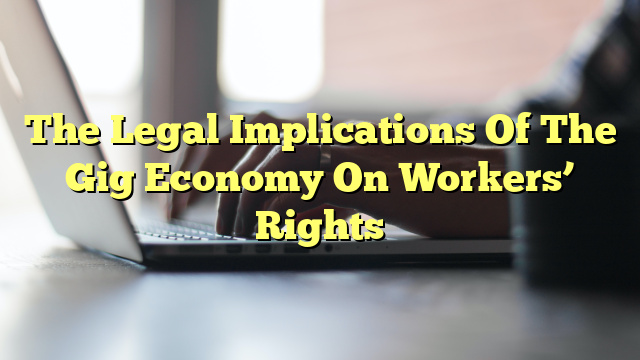The gig economy has become a major part of the global economy, driving employment and creating opportunities for people all over the world. The implications of the gig economy on workers’ rights, however, have not been as widely discussed. In this article, we will look at how the gig economy affects workers and the legal issues associated with it.
Table of Contents
- How Does the Gig Economy Affect Workers?
- What is the Gig Worker Law?
- How is the Gig Economy Legal?
- What are the Issues Associated with Gig Economy?
How Does the Gig Economy Affect Workers?
The gig economy has had a significant impact on the labor market. The growth of the gig economy has been driven by technological advances and an increased demand for flexible labor. This has resulted in an increase in the number of independent contractors, freelancers, and other forms of contingent labor.
These workers, who are often referred to as “gig workers,” are typically not covered by traditional labor protections, such as those found in employment law. As a result, they may not have access to the same rights and benefits as those who are employed on a full-time basis.
Gig workers also face other challenges. They often lack job security, as they are not guaranteed steady work. They may also not receive the same benefits as full-time employees, such as health insurance, paid vacation, and sick leave.
What is the Gig Worker Law?
The gig worker law is a set of regulations that sets out the rights and responsibilities of gig workers. The law defines who is considered an “independent contractor” and who is an “employee” under the law. The law also sets out the different types of benefits, such as health insurance and paid time off, that are available to gig workers.
The gig worker law is designed to protect the rights of gig workers and ensure that they are treated fairly. In the United States, this law is known as the “Gig Workforce Flexibility Act.” This law is currently being debated in Congress and has yet to be passed.
How is the Gig Economy Legal?
The gig economy is legal in many countries, although the regulations and laws vary from country to country. In the United States, the laws governing the gig economy are still being debated in Congress. However, many states have passed laws that provide protections for gig workers.
The most common protections for gig workers are minimum wage laws, overtime pay laws, and laws that require employers to provide a safe work environment. In some countries, gig workers are also protected by laws that require employers to provide health insurance and other benefits.
What are the Issues Associated with Gig Economy?
The gig economy has been associated with a variety of legal issues. These include the lack of job security, inadequate protection for gig workers, and the potential for exploitation.
The lack of job security means that gig workers may find it difficult to make long-term plans, as they may not be guaranteed steady work. This can be particularly difficult for gig workers who are trying to save for retirement or a home.
Gig workers may also be at risk of exploitation due to the lack of labor protections. Employers may attempt to take advantage of gig workers by paying them below the minimum wage or failing to provide benefits such as health insurance.
Finally, gig workers may not be able to access the same rights as full-time employees. This can include access to unemployment benefits, workers’ compensation, and other benefits that are typically associated with traditional employment.
Overall, the gig economy has had a significant impact on the labor market and has resulted in a number of legal issues. These issues have the potential to affect the rights of gig workers, and it is important that these issues are addressed in


The Gig Economy has drastically changed the legal landscape for workers’ rights. From diminished benefits to limited job security, workers’ rights are constantly under threat. This article is a must-read to keep workers informed and empowered.
The gig economy challenges existing labor laws and workers’ rights, so new protections must be devised.